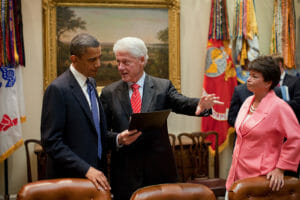Not Everyone Is Ready to Forgive Rebranded Iraq War Cheerleader Max Boot
Although he has denounced Donald Trump, critics can't forget that he beat the drum loudly for U.S. troops in Iraq. Max Boot said he feels "guilty" about those who died in the Iraq War, but his critics aren't so sure. (YouTube screenshot)
Max Boot said he feels "guilty" about those who died in the Iraq War, but his critics aren't so sure. (YouTube screenshot)
In the prologue to his most recent book, “The Corrosion of Conservatism: Why I Left the Right,” Max Boot writes that leftists have unfairly accused him of “war crimes” because he, like the majority of U.S. lawmakers, supported the invasion of Iraq. But many leftists and progressives remember that he didn’t simply support the disastrous Iraq War—he helped lead the charge—and tepid remorse does not change that.
A columnist at the Washington Post, senior fellow at the Council on Foreign Relations and analyst for CNN, Boot has recently had a public epiphany in which he denounced President Donald Trump and the Republican Party, becoming, he writes, “politically homeless,” and leading to his acceptance by mainstream Democrats. Jacobin Magazine’s Branko Marcetic described Boot as “a war-hungry neocon now being approvingly retweeted by liberals.”
But Boot’s criticisms of Trump weren’t enough to win over Peter Maas, a senior editor at the Intercept, who called his apology about Iraq “disingenuous.” Maas wrote that Boot “has helped create so much havoc, he has been wrong so completely, that it would be the definition of insanity to treat his ideas as fodder for anything other than a shredder.”
In February, John Ganz wrote at the Baffler: “Boot wants to submerge himself into the center of a crowd, one of the democratic mass, when in fact he was at its vanguard, pushing for the Iraq War early and often.”
“Just like Donald Trump and most other people, I was a supporter of the war in Iraq,” Boot writes in his book, seeking safety in the majority and to preface several excuses for his actions. Even after reports surfaced in 2004 about soldiers who abused prisoners at Abu Ghraib, Boot writes, he felt the war was being mismanaged but he thought the answer was to send more troops, as though silent internal doubts were enough. He even describes “inspirational” visits to Iraq with Gen. David Petraeus. Boot echoes his arguments on the war’s 10-year anniversary, in 2013, when he wrote that there was no need to repent for supporting the war.
Now, Boot writes that “it was all a big mistake,” but he also tries to avoid responsibility, arguing that supporters of the Iraq invasion were “like hapless passengers who got into a vehicle with a drunk driver.” At least 165,000 civilians died in direct violence during the Iraq War from 2003 to 2015, and twice as many civilians died due to sickness or malnutrition that was a result of the war. For some readers, Boot doesn’t offer an apology so much as an attempt to save face.
Maas writes of Boot’s attitude toward Iraq:
The guilt that Max Boot feels—he dwells on it for less than a sentence in the entire book—does not appear to be difficult to bear. Either he doesn’t feel all that guilty for what happened, or he doesn’t realize what happened. Whichever it is, it doesn’t reflect terribly well on him.
Hawkish ideas about the invasion of Iraq are hardly Boot’s only sin, according to his critics. For example, in 1999, Boot wrote that the Supreme Court’s decision to desegregate schools in the ruling Brown v. Board of Education was unconstitutional. At Vox, senior politics reporter Jane Coaston asked why it took so long for Boot to realize the Republican Party is racist when black conservatives have been saying so for nearly half a century.
Boot writes he wishes Jeb Bush had become president and devotes a sizable portion of his epilogue to criticizing Independent Vermont Sen. Bernie Sanders’ Medicare for All legislation in part because of concern about whether health insurance companies would be able to stay in business. Given Boot’s sloppy history, it seems fair to ask whether he should get any attention at all. Maas wrote:
Your support is crucial…It’s easy to understand why a penitent like Boot appeals to liberals and other members of the Trump resistance. He ratifies their sense of having been correct from the start, and his confession is enunciated in perfect sound bites, with just the right dose of abasement. Boot is an irresistible spectacle—the sinner with tears running down his cheeks dropping to his knees at the altar of all that is good, proclaiming that he has seen the light and wants to join the army of righteousness. But here’s the thing: Boot is only half-apologizing. And because he’s been wrong so many times and with so many ill consequences, he should be provided with nothing more than a polite handshake as he’s led out of the sanctuary of politics, forever.
With an uncertain future and a new administration casting doubt on press freedoms, the danger is clear: The truth is at risk.
Now is the time to give. Your tax-deductible support allows us to dig deeper, delivering fearless investigative reporting and analysis that exposes what’s really happening — without compromise.
Stand with our courageous journalists. Donate today to protect a free press, uphold democracy and unearth untold stories.






You need to be a supporter to comment.
There are currently no responses to this article.
Be the first to respond.